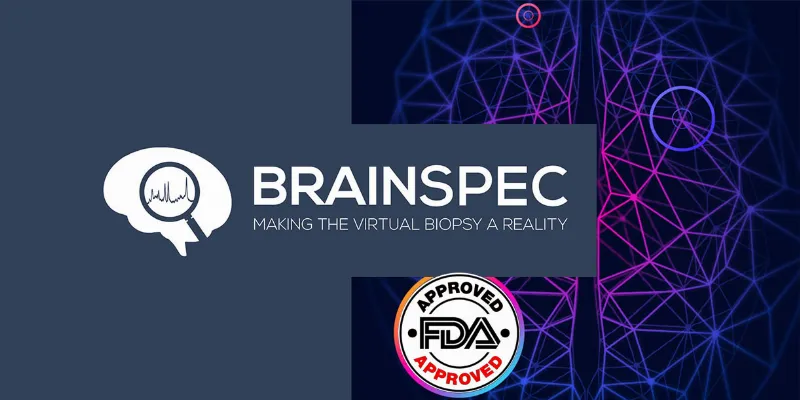FDA Clears BrainSpec's AI-Powered MRS Platform for Brain Disease Diagnosis


FDA & EMA |
28 November 2023
The FDA has cleared BrainSpec's innovative magnetic resonance spectroscopy (MRS) platform for non-invasive brain chemistry measurement. This development marks a significant stride in medical imaging, and the AI-powered technology promises to transform the diagnostic landscape for brain-related illnesses, including Alzheimer's disease, MS, epilepsy, and low-grade gliomas.
BrainSpec, a leading innovator in neuroimaging, announced that it has received full clearance from the U.S. Food and Drug Administration (FDA) for its new artificial intelligence (AI)-backed MRS imaging technology. This significant milestone marks a new era in the field of neurology and AI-driven medical solutions.
This first-ever brain chemistry database allows clinicians to quickly deduce brain biomarker data, assisting in the diagnosis of conditions such as Alzheimer's Disease and Traumatic Brain Injury. BrainSpec Core™ demonstrates 85% sensitivity and 90% specificity in detecting 2-Hydroxyglutarate, an oncometabolite present in low-grade gliomas.
A Milestone in Neurology
Magnetic Resonance Spectroscopy (MRS) is a technique that utilizes the same machinery as Magnetic Resonance Imaging (MRI) to measure the concentration of specific chemicals, including neurotransmitters. Unlike traditional magnetic resonance imaging (MRI) that focuses on anatomical images, MRS delves into the chemical composition of brain tissues.
This approach enables clinicians to perform virtual biopsies, effectively examining the metabolic pathways and chemical concentrations in the brain. It also offers comprehensive insights into the pathophysiology underlying various neurological disorders.
Clinical Implications and Benefits
The ability to quantify neurometabolites like 2-hydroxyglutarate non-invasively is a game-changer. This direct and non-invasive marker could lead to more precise tumor classification, aiding significantly in treatment decision-making. Moreover, the AI component of BrainSpec's software reduces the turnaround time for MR spectroscopy results from days to mere minutes, a crucial factor in timely patient care.
BrainSpec's software is compatible with MRI scanners from major manufacturers, including GE HealthCare, Siemens, and Philips, which collectively account for over three-quarters of the global MRI market. The company claims that using MRS for diagnostics can lead to significant cost savings of up to $98,000 per patient over five years compared to the current standard of care alone.
Alex Zimmerman, CEO of BrainSpec, expressed excitement about the FDA nod,
"We are thrilled to be given this full clearance by the FDA. It signals a new era of software enhancements that will not only complement but also speed up the complicated and lengthy process of diagnosis. Our aim is not to replace the critical role of physicians but to augment their expertise with invaluable information previously unavailable. We believe that by equipping healthcare professionals with cutting-edge tools, we can empower them to make more informed and precise treatment decisions, ultimately leading to improved patient care"
Digital Infrastructure
BrainSpec is joining the growing trend of AI software adoption in the medical imaging sector. AI has the potential to revolutionize the way we diagnose and treat diseases. However, there are challenges that need to be addressed before it can be widely adopted, one of which is the need for further digital infrastructure.
"There are several key advantages of this AI solution that have important clinical relevance," remarked Dr. Raymond Y. Huang, MD, PhD, Division Chief of Neuroradiology at BWH. "First, it provides quantitative neurometabolite measurements that can be used to aid in monitoring the changes in brain tumors that are undergoing therapy. The second strength is that it automates the delivery of the MR spectroscopy results, reducing turn-around time from days to minutes which is critical for the clinical care of patients. Finally, ability to measure 2-hydroxyglutarate and other brain metabolites provides a direct and non-invasive marker of low-grade gliomas that could lead to a more accurate classification of individual tumors benefitting decision making."
The FDA's clearance of BrainSpec’s AI-backed solution marks a significant advancement in neurology. However, the journey does not end here. The future holds immense possibilities for further advancements in this field.
In June 2022, BrainSpec received FDA designation as a Breakthrough Device for estimating isocitrate dehydrogenase (IDH) status in glioma patients, for whom biopsies are inadvisable.











Comments
No Comments Yet!